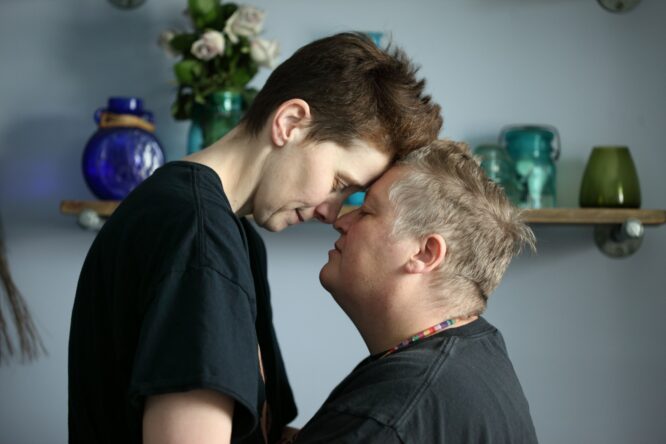So, here’s the latest entry in the never-ending glossary of modern dating: floodlighting. And no, it’s not romantic.

It’s what happens when someone hits you with way too much emotional intensity, way too early. Think of it like emotional oversharing on steroids. They show up, unload their life story, trauma, and chaos before you’ve even finished your first drink. At first, it can seem deep, but stick around, and it starts to feel more like a trap. Here’s what it looks like, and why it’s becoming more common in the Gen Z dating scene.
1. They start trauma-dumping before you know their last name.

You’ve barely learned where they’re from, and suddenly, you’re knee-deep in childhood trauma, toxic exes, and personal breakdowns. It’s not that their honesty is the issue, it’s the speed and volume of it. There’s no buildup, no trust built—just emotional overload out of nowhere. It’s not connection, no matter how much it feels like it might be. It’s chaos dressed up as depth.
2. You feel like their unpaid therapist.

Every message turns into a vent. Every call is a download of everything going wrong in their life, and you’re sitting there wondering how you became their crisis hotline. You didn’t sign up to be their emotional safety net, but suddenly, it’s your job to manage their mood. That’s not dating. That’s draining.
3. They act like baring their soul means you’re close.

Just because someone opens up fast doesn’t mean you’re emotionally bonded. However, floodlighters use oversharing as a shortcut to fake intimacy. It feels deep—until you realise it’s all one-sided. They mistake intensity for actual closeness, and you’re left confused about whether this is a real connection or just a spotlight pointed right at them.
4. They call you their “safe space” after three dates.

Sounds sweet, until you realise they barely know you. Being called a safe space feels like a compliment, but it also dumps a pile of emotional responsibility on you that you didn’t ask for. They’re trying to make you their anchor before even seeing if you’re compatible. That’s not trust, that’s pressure.
5. You’re doing all the emotional heavy lifting.

Every time something goes wrong in their life, you’re the one they run to. You’re always talking them down, calming them, reassuring them, but they never seem to return the favour. Dating someone shouldn’t feel like a full-time job in emotional management. You’re meant to be building something together, not carrying it alone from the start.
6. The deep stuff comes way too early.

Look, it’s fine to talk about your past. The problem is that floodlighting skips the “getting to know you” part and dives headfirst into all the heavy stuff before you’ve even learned how they take their coffee. It’s not openness; it’s emotional dumping—and it doesn’t leave space to build trust naturally.
7. You feel weirdly guilty for needing space.

You want a breather, but they make you feel like a bad person for not being available 24/7. The second you pull back, they say things like “I really needed you right now” or “I guess I’m just too much.” That kind of guilt-tripping is subtle, but it builds fast—and it makes you feel like setting any boundaries is some kind of betrayal.
8. You know more about their trauma than their actual personality.

They’ve told you everything about their painful breakup, their family drama, their mental health… but you couldn’t say what they do for fun or what they actually like. It’s all depth and no light. After a while, it stops feeling meaningful and just starts to feel heavy.
9. They blur the lines between emotional support and dating.

You’re not sure if you’re their partner, their best mate, or their personal counsellor. Everything’s tangled. They want deep chats, constant reassurance, and emotional availability, but skip the part where they actually show up for you. It leaves you confused and over-invested in something that doesn’t even feel stable.
10. They use vulnerability like a fast pass.

Floodlighters overshare to try and speed up connection. They think if they tell you everything, you’ll feel close to them fast. Of course, real intimacy doesn’t work like that—it’s earned, not dumped in your lap. Instead of growing into a bond, you’re forced into one. When it feels rushed, it usually burns out just as quickly.
11. They expect you to match their emotional pace.

If you’re more private or slower to open up, they act like you’re holding out. They’ll say things like, “I’ve told you so much, and I don’t even know what you’re thinking.” However, sharing isn’t a transaction. You don’t owe them your life story just because they threw theirs at you first.
12. They talk a lot about self-awareness, but don’t actually change.

They’ll tell you they have “attachment issues” or that they “always overshare,” like naming it makes it okay. It might sound emotionally intelligent, but it starts to feel like they’re just using it to excuse the behaviour. Real self-awareness means actually adjusting how you show up. Floodlighters often stay stuck in the same loop—they just have better language for it.
13. You leave conversations feeling wiped out.

It’s not always obvious during the chat, but afterwards, you feel tense, mentally exhausted, or like you’ve run an emotional marathon. That’s your body telling you something’s off. Healthy conversations leave you feeling clearer or more connected. If every interaction feels like a full-on unload, that’s not sustainable.
14. You had no space to figure out what you want.

Everything moved so fast, you didn’t get a second to breathe or check in with yourself. You’ve been so busy managing their emotions that you haven’t even asked whether you actually like this person or feel safe with them. Floodlighting doesn’t leave room for choice. It overwhelms you into closeness. That’s not romance—that’s pressure disguised as depth.




